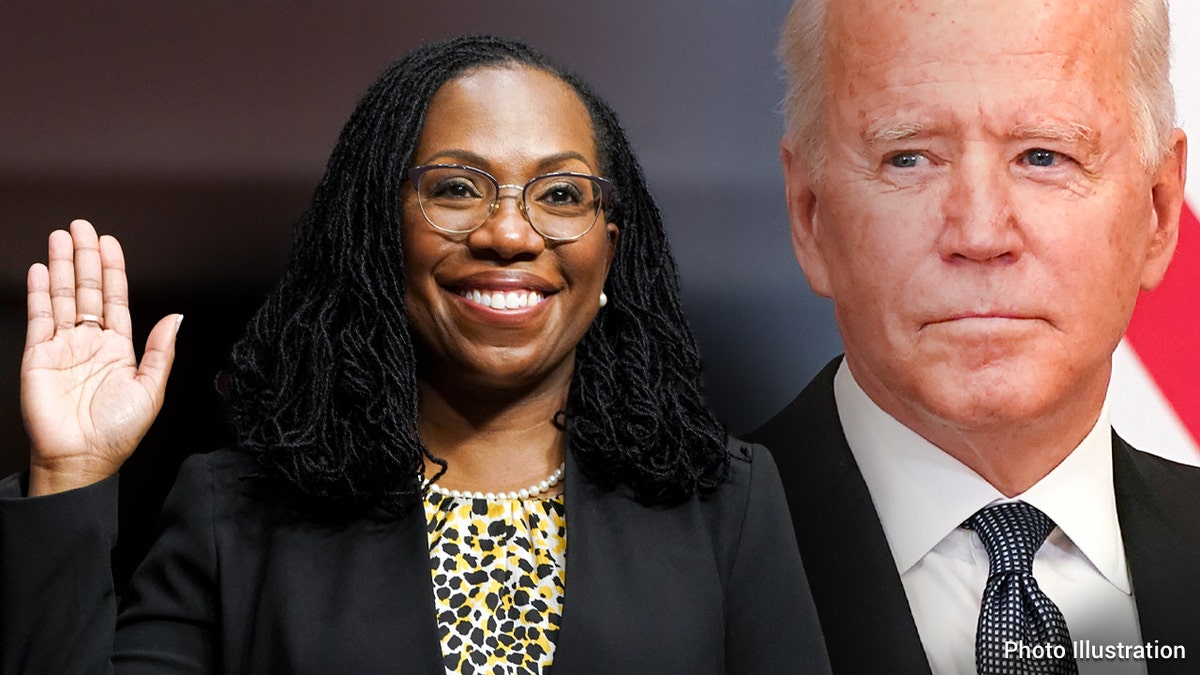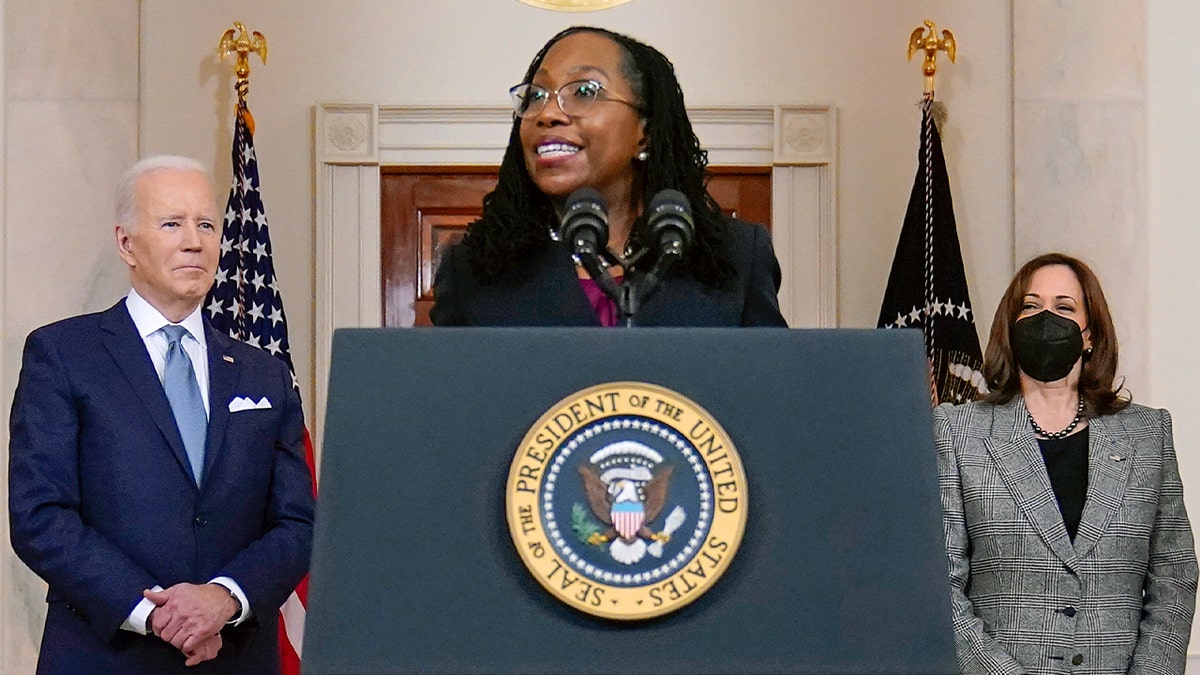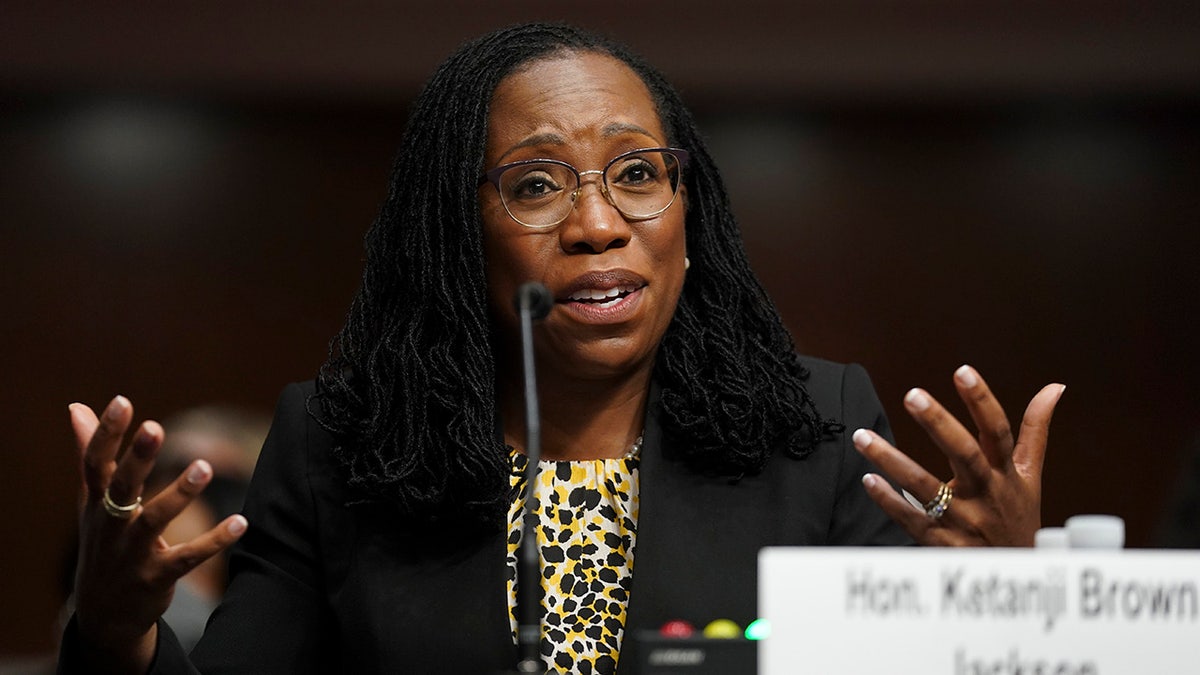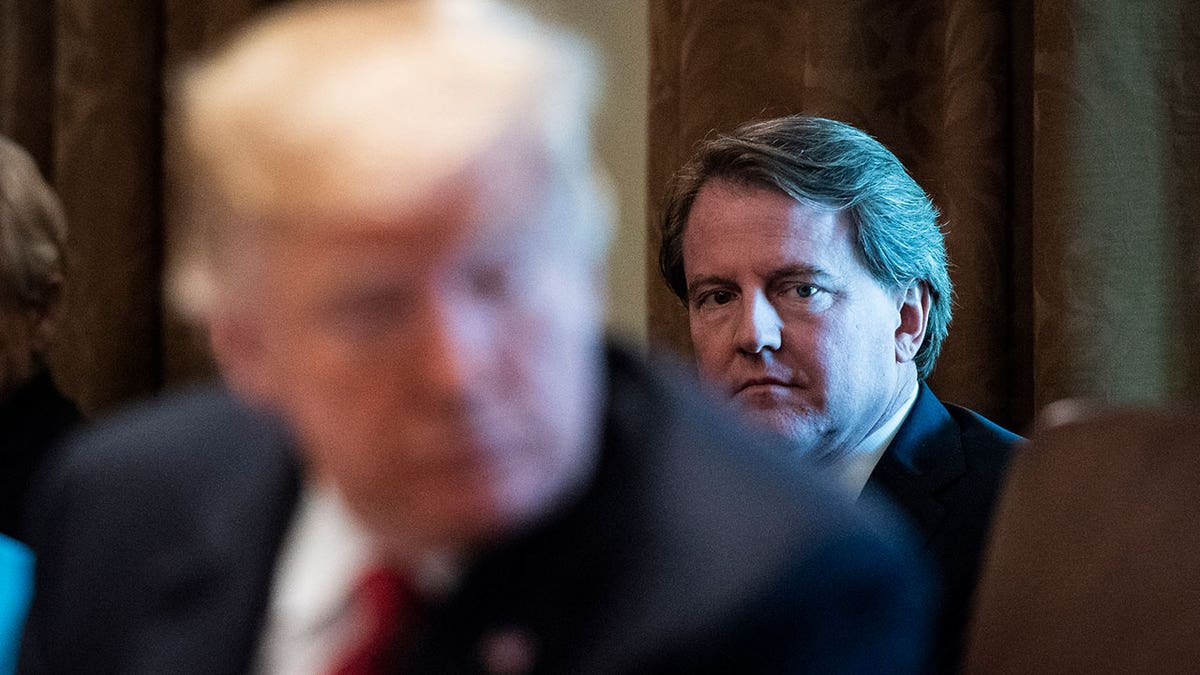Democrats, Republicans set to thoroughly vet Ketanji Brown Jackson
Fox News chief legal correspondent Shannon Bream reports on the Supreme Court nominee's legal education and experience.
In a Supreme Court confirmation process so far lacking in drama and rancor, Judge Ketanji Brown Jackson will take the next step this week in a process that, by all accounts, will soon make her the 116th justice.
The 51-year-old nominee goes before the Senate Judiciary Committee Monday for public hearings with supporters promoting her deep legal background, perceived empathy and history-making potential.
Her rise would fulfill President Biden's pledge to name the first Black woman to the nation's highest court, but the four days of hearings have the potential of raising uncomfortable questions about race and whether the courts and judges have become too politicized.
But the White House remains quietly confident Jackson, a Washington-based federal appeals court judge, will get the coveted promotion.
"She just was approved by the Senate for her current job about a year ago. I think that would have to give the White House some comfort that she knows the drill," said Thomas Dupree, a former top Justice Department official. "She's been through a confirmation proceeding. Senators have voted for her previously, including some Republican senators."

Ketanji Brown Jackson, nominated to be a U.S. Circuit Judge for the District of Columbia Circuit, is sworn in to testify before a Senate Judiciary Committee hearing on pending judicial nominations on Capitol Hill, April 28, 2021, in Washington. (Kevin Lamarque-Pool/Getty Images)
Senate Democrats have fast-tracked Judge Jackson's confirmation, despite a lengthy paper trail and the many professional hats she has worn:
– Supreme Court law clerk to Justice Stephen Breyer, whose seat she would fill
– Private attorney at four elite law firms
– Federal public defender (the last justice with such significant experience defending criminal defendants was Thurgood Marshall)
– Member of the U.S. Sentencing Commission, which during her tenure enacted bipartisan reforms to reduce disparate prison time for certain drug offenders
– Federal district court judge for eight years
– Judge on the U.S. Court of Appeals for the D.C. Circuit, where three current justices once served
Three Republicans voted for her in June for that job: Lisa Murkowski of Alaska, Susan Collins of Maine and Lindsey Graham of South Carolina.
"It means the radical Left has won President Biden over yet again," Graham tweeted after Jackson was tapped for the high court.
Political promise fulfilled
The president, in introducing his nominee last month, said Jackson represents his dual approach to filling this and other judicial vacancies: someone who "reflects the full talents and greatness of our nation with a nominee of extraordinary qualifications and that we inspire all young people to believe that they can one day serve their country at the highest level."
In doing so, Biden fulfilled a 2020 campaign promise to appoint a Black woman to the court.

Judge Ketanji Brown Jackson speaks after President Biden announced Jackson as his nominee to the Supreme Court in the Cross Hall of the White House Feb. 25, 2022, in Washington. Vice President Kamala Harris listens at right. (AP Photo/Carolyn Kaster)
Her impressive resume has created both political opportunity and peril, as Senate Republicans have focused on several of Jackson's rulings and her race. Senator Roger Wicker, R-Miss., said Jackson would be "the beneficiary of this sort of quota" on affirmative action.
Despite the slim chance her nomination will be derailed, activists on both sides are using the confirmation process as a broader platform in a midterm election year to promote competing political agendas.
The left-leaning People for the American Way has produced a series of pro-Jackson videos, and its webpage is using the nomination to raise money.
"Please rush a donation to help us take on the far right's inevitable attacks on her and make sure that Judge Jackson gets the fair consideration she deserves," the site says.
Another court-focused liberal group, Demand Justice, last year sent a billboard truck around Washington with the words "BREYER RETIRE." The nonprofit, which does not have to disclose its donors, now has its wish and is airing TV ads promoting Jackson.
The conservative Judicial Crisis Network, while not attacking Jackson directly, has launched a $2.5 million ad campaign to highlight what it calls "secret money from liberals."
"Now that they have a [Supreme Court] vacancy, they want payback for their dark money spending in the form of a Supreme Court justice who will be a rubber stamp for their unpopular and far-left political agendas," JCN said.
It comes as public confidence in the Supreme Court has reached historic lows in recent months over whether the American people trust the justices to act in the country's best interests.
The high court in coming months will be deciding hot-button issues like abortion access, gun rights, religious liberty disputes, immigration limits and affirmative action. And these rulings could further fracture public confidence.
Many court watchers place blame squarely with President Biden. After demands for change from progressives during the 2020 campaign, his Commission on the Supreme Court — after months of public hearings — recently offered a report, but no recommendations, on suggested reforms, such as expanding the number of justices and imposing term limits. Some commission members and witnesses had complained the high court, with a 6-3 conservative majority, is out of touch and out of control.
The justices themselves have taken notice, warning politicizing the court or adding more justices may erode the institution's credibility.
"You can cavalierly talk about packing or stacking the court. You can cavalierly talk about doing this or doing that. At some point the institution is going to be compromised," Justice Clarence Thomas said in a speech last week. "By doing this, you continue to chip away at the respect of the institutions that the next generation is going to need if they're going to have civil society,"
Thomas has long been a political lightning rod for his conservative views. And Jackson had her own brief professional encounter with the court's senior associate justice.
When working for Breyer more than two decades ago, Jackson and other law clerks at the time had lunch with Justice Thomas.
She later told the authors of a 2007 biography of Thomas, "Supreme Discomfort," what she was thinking at the time about the right-leaning justice: "'I don't understand you. You sound like my parents. You sound like the people I grew up with.' But the lessons he tended to draw from the experiences of the segregated South seemed to be different than those of everybody I know."
Biggest stage
A vacancy on the U.S. Supreme Court triggers a rare convergence of the highest levels of the executive, legislative and judicial branches. It usually attracts nationwide attention, but these Senate hearings come at a time when Americans are preoccupied with other headline-making events, like the war in Ukraine, rising inflation and gas prices and the COVID-19 pandemic pivot.

Ketanji Brown Jackson, nominated to be a U.S. Circuit Judge for the District of Columbia Circuit, testifies before a Senate Judiciary Committee hearing on pending judicial nominations on Capitol Hill, April 28, 2021, in Washington. (Kevin Lamarque-Pool/Getty Images)
JUSTICE THOMAS SLAMS CANCEL CULTURE, ‘PACKING’ SUPREME COURT
And it represents a dramatic shift from recent Supreme Court nominations, including President Obama's frustrated 2016 nomination to replace Justice Scalia with Merrick Garland, now Biden's attorney general.
Then there were President Trump's three high court picks, which prompted highly partisan opposition from Democrats, especially the combative 2018 fight over Justice Brett Kavanaugh. Allegations of sexual harassment and assault – played out in graphic Senate testimony – riveted the nation.
But times have changed — sort of. Jackson's confirmation to replace her mentor would not likely change the ideological balance on the court, and some Republicans may be uncomfortable taking on the nominee directly on issues like race.
Minority Leader Mitch McConnell, R-Ky., has privately urged his GOP colleagues to stay away from those tactics, and instead pivot to criticizing the president over his broader criteria for filling the judiciary with a focus on "empathy."
"Liberals are saying that Judge Jackson’s service as a criminal defense lawyer and then on the U.S. Sentencing Commission give her special empathy for convicted criminals," said McConnell. "I guess that means that government prosecutors and innocent crime victims start each trial at a disadvantage."
Also helping lower the political temperature may be Jackson's effusive personality and networking skills, impressing some Senate Republicans in the one-on-one private meetings the nominee has been conducting in recent days.
She was described by some GOP lawmakers as "thorough," "charming" and "wise."
Getting through
"Reliability" has long been a key criteria when presidents decide who should sit on the Supreme Court – someone with enough of a proven record to ensure rulings would remain relatively consistent over time.
The White House believes Judge Jackson's near decade on the federal bench on two high-profile seats gives them that confidence.
"They wouldn't be in the position of getting an unfair surprise if they elevated someone to the Supreme Court and not really knowing what they're going to get," said court watcher and attorney Dupree.

White House Counsel Don McGahn listens as President Trump speaks during a cabinet meeting in the Cabinet Room of the White House Oct. 17, 2018. (Jabin Botsford/The Washington Post via Getty Images)
That record includes more than 500 opinions from the bench and more than 2,000 pages of personal records filed with the Judiciary Committee, including speeches, law review articles and corporate manuals. Among the issues Republicans have signaled they will raise with the nominee:
Executive privilege: A 2019 opinion rejecting President Trump's efforts to shield his White House Counsel Donald McGahn from a legislative subpoena over a House investigation into Russian interference in the 2016 election. "The primary takeaway from the past 250 years of recorded American history is that presidents are not kings," Jackson concluded.
And as an appeal judge, she was in the majority last year rejecting former President Trump's claim of executive privilege over the release of internal documents related to the Jan. 6 riot at the U.S. Capitol. Those records were turned over to a House Select Committee investigating the incident after the Supreme Court refused to intervene.
National security: Ruling for the Trump administration, saying it had the executive authority to waive environmental laws to construct a section of the border wall along Mexico.
Abortion: Jackson has a scant record on reproductive rights, but in 2018 she ruled against the Trump administration over its decision to end federal funding for a teen pregnancy prevention program.
Criminal law: Sen. Josh Hawley, R-Mo., has expressed concern over what he said was lax sentencing of about 10 child pornography offenders by Judge Jackson, suggesting a pattern of going soft on certain criminal defendants. The White House called the claim unfair and that Hawley "cherry-picked" the nominee's record out of context.
CLICK HERE TO GET THE FOX NEWS APP
Habeas corpus: Other Republicans also promised tough questions over Jackson's representation of terror suspects held for years without charges in Guantanamo Bay, Cuba, while she was a federal public defender and later as a private lawyer. Some conservatives have labeled her work defending the detainees as overly zealous, but Jackson last year told lawmakers she was "among the many lawyers who were keenly aware of the threat that the 9-11 attacks had posed to foundational constitutional principles, in addition to the clear danger to the people of the United States."
Faith: Judge Jackson's religious views will likely be highlighted. In her first moment in the national spotlight, after being introduced by the president, she looked inward. "I must begin these very brief remarks by thanking God for delivering me to this point in my professional journey," she said at the White House. "My life has been blessed beyond measure, and I do know that one can only come this far by faith."
Years earlier, she had served on the advisory board of a large Maryland-based Baptist high school. In a 2011 graduation speech there, she spoke about struggling as a young adult: "Even in my loneliness, I thanked God for the opportunity he'd given me, for the firm foundation he had provided, and also for how far I had come."














































